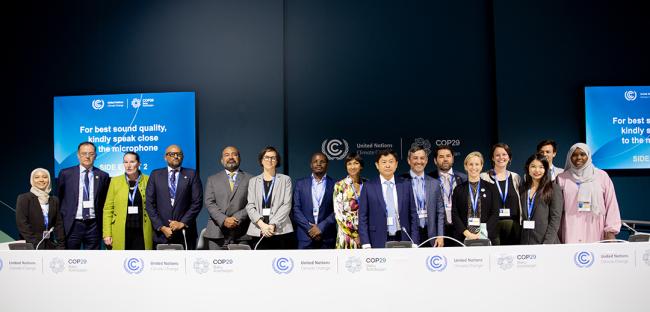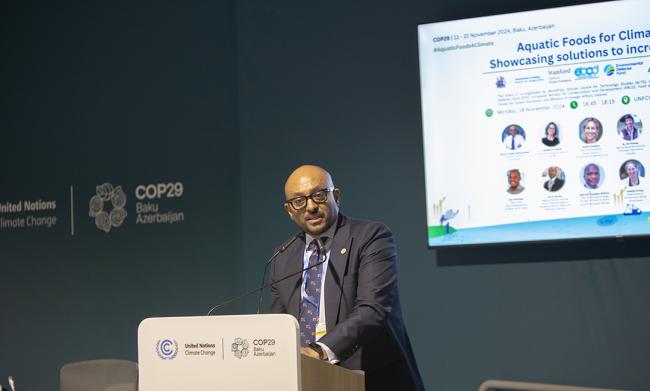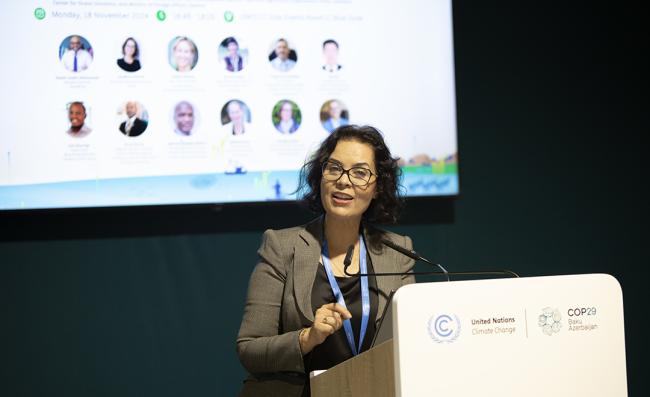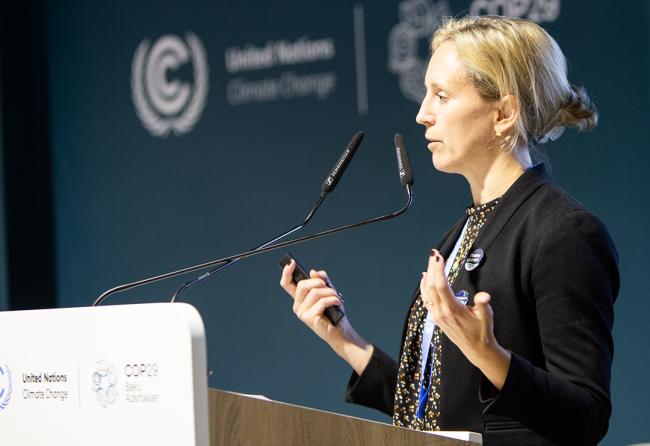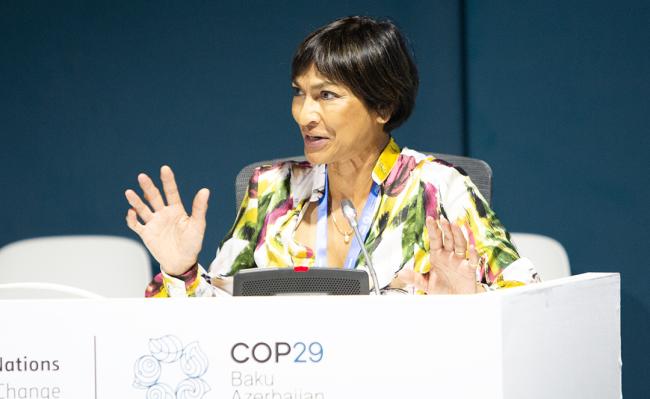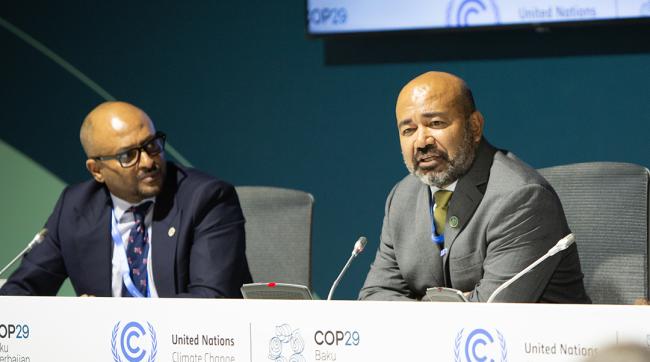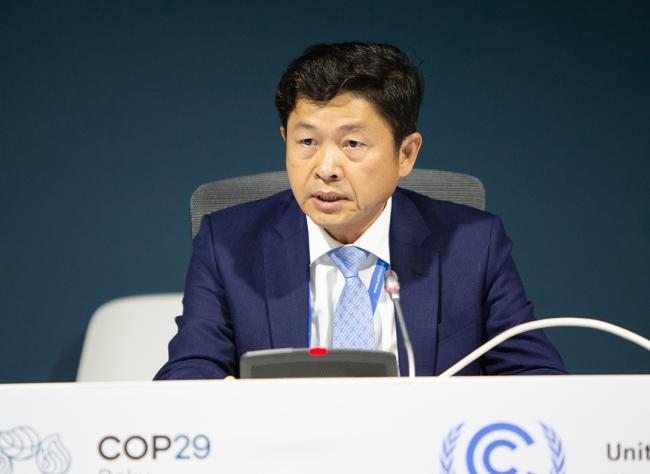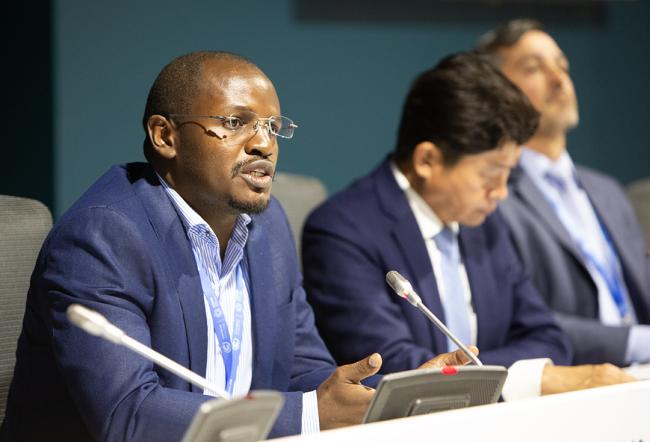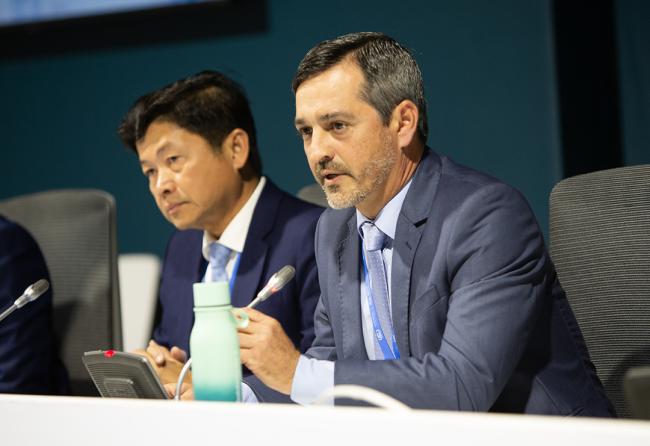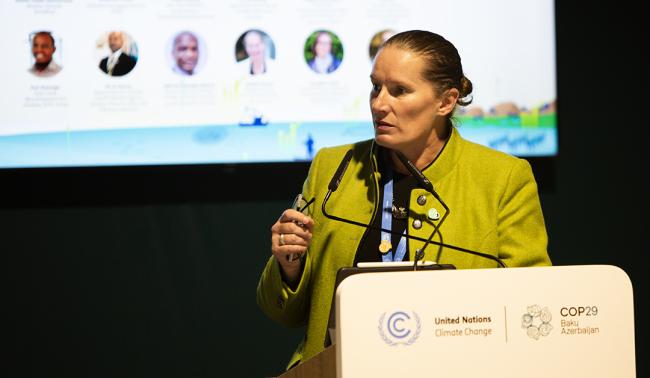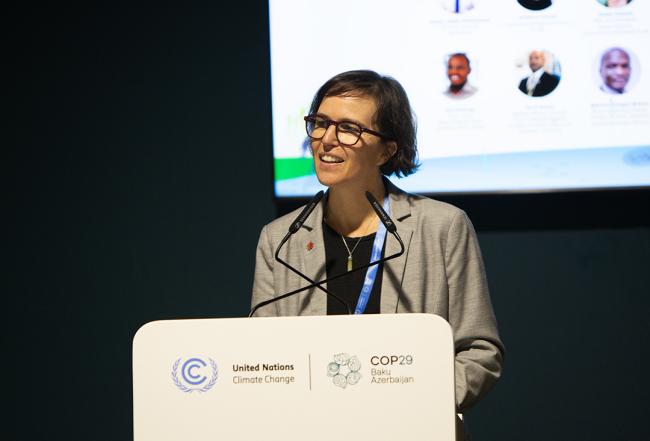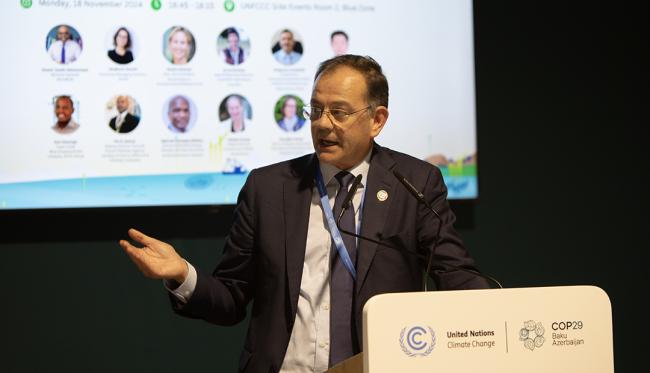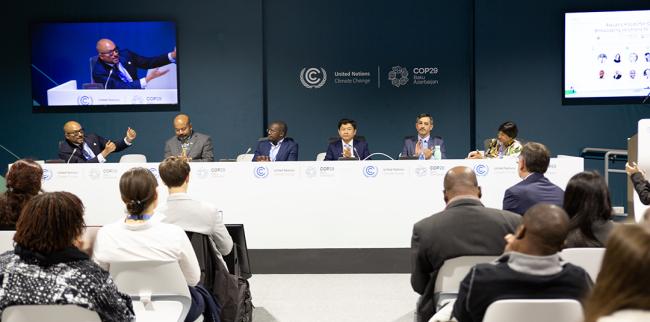About
Unlocking the potential of aquatic food as a solution to the climate crisis is vital to ensuring sustainable food production globally. This event showcased best practices and innovative ways to transform aquatic food from an overlooked nature-based solution to a major player in countries’ climate strategy plans.
Over the past few years, the role of aquatic foods in climate solutions has often been overlooked. This is changing, however, with new interest in their potential to help tackle the climate crisis. This event put the spotlight on aquatic foods as a vital tool in the toolbox of nature-based solutions by discussing ways in which they can be integrated in a country's climate strategies.
Essam Yassin Mohammed, Director General, WorldFish, moderated the event. In her opening remarks, Ismahane Elouafi, Executive Managing Director, CGIAR, emphasized the “tremendous potential” of including aquatic foods as part of climate strategies. She discussed ways to achieve this, such as: scaling up innovation to enhance resilience; pairing policy action with financial investment; including fisheries management in Nationally Determined Contributions (NDCs) and National Action Plans; implementing the World Trade Organization Agreement on Fisheries Subsidies; and developing climate-smart aquaculture systems.
Kristin Kleisner, Environmental Defense Fund (EDF), set the scene by outlining the dire impact of climate change on aquatic food systems and current threats, such as effects on food production and supply chains, ocean acidification, and food security. The result, she warned, is contributing to increasing inequalities in the world today. She shared EDF’s and its partners’ report on Integrating Blue Foods Into National Climate Strategies, which provides policy guidelines on five key areas: developing sustainable fisheries management; improving aquaculture production; strengthening blue food supply chains; changing consumption patterns and diets; and implementing sustainable blue carbon habitats.
Su McCluskey, Special Representative for Australian Agriculture, shared Australia’s work on integrating aquatic systems in climate strategies locally, including: investment in Indigenous communities’ process in developing aquatic food; embracing innovative methods of transporting aquatic food from the Ocean to consumers; and looking into fish breeding programmes that build resilience and reduce diseases. On an international level, Australia, she stated, is supporting other Pacific and Southeast Asian countries through aid programmes and the Australian Centre for International Agricultural Research; developing partnerships with other governments and the private sector for capacity-building, upskilling, and knowledge sharing on the nexus of aquatic foods and climate; and engaging with women and youth globally on nutrition and food security.
Pio Manoa, Deputy Director-General, Forum Fisheries Agency (FFA), commended efforts by Pacific countries to ensure climate-smart measures on fisheries management are in place, including the adoption of a climate strategy for the region and the progress made on climate adaptation resilience and sustainable fishing practices. He emphasized the need to keep the 1.5°C target alive; inclusion of the Ocean in the agenda of upcoming meetings; and putting measures in place to protect tuna stocks.
Sok Silo, Secretary General, Council for Agricultural and Rural Development, Cambodia, shared Cambodia’s initiatives in advancing climate solutions, including: developing Cambodia’s climate strategy plan; implementing adaptation and mitigation measures to improve water management; investing in renewable energy; and promoting sustainable agriculture and food systems. On advancing the use of aquatic food to ensure sustainability and food security in the country, Silo highlighted Cambodia’s promotion of aquaculture development; implementation of a fisheries strategy plan; capacity development and adoption of technology to improve the quality of aquatic food; promotion of aquaculture products; and enforcement of fishery laws.
Joel Onyango, African Centre for Technology and Studies (ACTS), highlighted the need to include women in developing climate solutions, particularly those related to aquatic foods, citing lack of access to resources and culture as main barriers. To address these two barriers, he pointed to optimizing systems to benefit women and local communities, improving access to information, developing women-focused initiatives, and ensuring women have access to financial resources and digital space.
Diogenes Lemainski, Ministry of Fisheries and Aquaculture, Brazil, shared Brazil’s initiatives to integrate aquatic foods into climate strategies. She said this includes the creation of permanent committees on fisheries management and conducting climate discussions within different government bodies and agencies. For the development of the aquaculture sub-sector, he added, Brazil is working on promoting resilience in food production systems through aquaculture, aquaponics, biotechnology, and funding. He cited the example of the Amazon Fund, which is used to promote sustainable food production systems by fishermen.
Mohammed asked panelists to discuss the barriers that hinder the integration of aquatic foods in national climate strategies. In response, McCluskey pointed out that the focus has always been on land-based solutions rather than on aquatic ecosystems. However, she highlighted the increase of engagement in this sector, including the increase in investment flows for aquaculture.
Manoa noted that all decisions to streamline work in this sector by Pacific countries are made by consensus, often resulting in a “watered-down” decision. Other challenges, he noted, include: different government bodies overseeing climate change issues and fishery sector issues; lack of expertise to carry out risk assessments, particularly in small island developing States (SIDS); and lack of capacity to develop this sector.
Silo stated that coordination among all actors, including communities and the private sector, can be difficult and lead to poor implementation of strategy and policy. He called for partners to support Cambodia in strengthening and improving its aquatic food system.
Onyango pointed to agency issues such as culture and lack of sustainable investment as key barriers to the inclusion of aquatic foods as part of the climate solution. Finally, Lemainski stated that complex eligibility rules and requirements to access global climate funds make it difficult to include fisheries and aquaculture as climate solutions. He noted other challenges, such as knowledge gaps on the carbon footprint of the fishery sector and lack of awareness of how aquatic foods can contribute to addressing the climate crisis.
Valerie Hickey, World Bank, provided brief remarks, emphasizing three areas the World Bank is working to address: how production and consumption of aquatic food can be made sustainable; how to ensure the supply of aquatic food works for producing countries; and how to include aquatic food in the food security agenda.
Georgina Kemp, International Development Research Centre (IDRC), stressed nature-based solutions are critical to tackle climate change, citing Canada’s and IDRC’s programme on harnessing nature-based solutions to make the agricultural sector sustainable and inclusive and to make food production systems productive, including development of aquatic foods, in 10 countries.
In closing remarks, Manuel Barange, Assistant Director General of the Fisheries and Aquaculture Division, Food and Agriculture Organization of the UN (FAO), commended the growing focus on aquatic foods as part of the climate solution. To maintain the focus on aquatic foods and ensure its progress in future discussions, he explained that the aquatic food sector itself should be made more sustainable and adaptive to climate change.
Organizers: WorldFish, ACTS, Aquatic Blue Food Coalition, EDF, European Bureau for Conservation and Development (EBCD), FAO, Stanford Center for Ocean Solutions
Contact: Michelle Tigchelaar | M.Tigchelaar@cgiar.org
Website: https://worldfishcenter.org/
To receive free coverage of global environmental events delivered to your inbox, subscribe to the ENB Update newsletter.
All ENB photos are free to use with attribution. For 2024 UN Climate Change Conference Baku - Side Events , please use: Photo by IISD/ENB | Angeles Estrada Vigil

